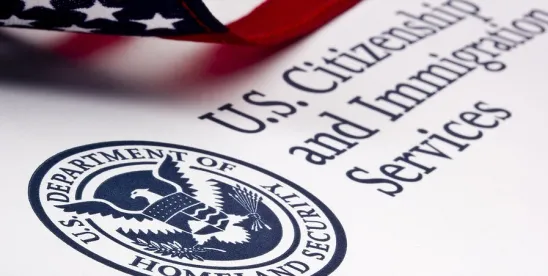On May 20, 2020, U.S. Citizenship and Immigration Services (USCIS) settled a long-pending lawsuit regarding its “itinerary” requirement for offsite H-1B workers. This settlement, which overturns 10 years of policies limiting employers of certain H-1B visa holders, came after a pivotal March 10, 2020 District Court opinion that rejected USCIS’s interpretation of the employer-employee relationship for H-1B workers and a stringent itinerary rule for offsite employment. USCIS’s restrictive position has been a long-standing issue for consulting and staffing companies that employ H-1B workers.
Background
H-1B visa sponsorship requires a valid employer-employee relationship between the sponsoring employer and the H-1B employee. USCIS regulations define an employer-employee relationship as the ability of a company to “hire, pay, fire, supervise, or otherwise control the work of any such employee.…” USCIS has added restrictions to this definition, which has led to both denials of H-1B petitions, as well as to shortened approvals of H-1B petitions. In one noteworthy example, USCIS approved an H-1B petition for a single day of validity.
This more restrictive policy regulating offsite H-1B employment came to light in a January 8, 2010 memorandum where USCIS asserted the authority to deny H-1B petitions based on a restrictive reading of the definition of an “employer-employee relationship,” especially when an H-1B visa holder performed work at an off-site location. USCIS’s interpretation of “employer-employee relationship” has become even narrower under the current administration, with substantive changes in a February 2018 memo titled, “Contracts and Itineraries Requirements for H-1B Petitions Involving Third-Party Worksites.” This memo required a specific itinerary of the dates and locations of employment, as well as proof that the employment relationship will continue to exist for the entire requested H-1B validity period.
This narrowing of the regulatory adjudication standard has led to an increase in H-1B denials and truncated approvals, without any change in law or USCIS regulations. Two recent court decisions ruling against USCIS’s position led to the settlement agreement on May 20.
ITServe Alliance, Inc. v. Cissna decided March 10, 2020.
In the ITServe Alliance case, plaintiffs argued that USCIS’s narrow interpretation of “employer-employee relationship” was unsupported by law or regulation. Established law allows an employer to retain an H-1B employee during “nonproductive” periods as long as the company continued to pay the required wage to the H-1B visa holder. The court dismissed USCIS’s interpretation and ruled, “[t]he current CIS interpretation of the employer-employee relationship requirement is inconsistent with its regulation, was announced and applied without rulemaking, and cannot be enforced.”
Serenity Info Tech et al. v. Kenneth T. Cuccinelli decided May 20, 2020.
Issued on the same day as the settlement in the above case, the Serenity Info Tech decision closely followed the opinion and holding of the ITServe Alliance decision. The judge concluded that “there is no basis in the INA [Immigration and Nationality Act] or the Agency’s regulations for requiring a petitioner to submit evidence of specific, qualifying work requirements and micro-location information for every single day of the visa period,” and, “the Agency’s 2018 interpretation of the statute and regulations, as applied in the instant case, is owed no deference.”
The Settlement
The USCIS-ITServe settlement will immediately affect current and prior H-1B filings with regard to the standard of adjudication of the employer-employee relationship, and the validity period of H-1B approvals for employment at third party locations.
Most notably for all employers, USCIS agreed to rescind “in its entirety within 90 days” the 2018 Contract and Itinerary Memorandum.
Second, USCIS will reopen and adjudicate decisions on H-1B adjudications that were the subject of the ITServe Alliance lawsuit against USCIS, and during re-adjudication will not apply the interpretation of the current regulatory language, but comply with the March 10, 2020 decision in ITServe Alliance, Inc. v. Cissna.
It is important to note that the settlement does not prevent the Department of Homeland Security (DHS) or USCIS from issuing new regulatory guidance or sub-regulatory guidance regarding H-1B eligibility.





 />i
/>i
